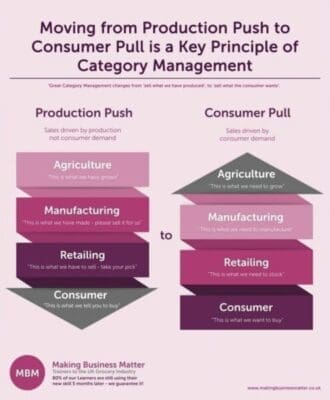Identify, Sell and Land More Opportunites with These Category Management Tips
Category management is the process of grouping like products into a singular category based on the needs of the consumer, and then developing promotional, merchandising sales, and other retail efforts to achieve consumer satisfaction that also benefit the supplier & retailer. These Category Management tips will help you to cut to the chase…
Simply put, it is about identifying more opportunities, selling more opportunities, and landing more opportunities, that meet the needs of the shopper.
Tips 1-10
- 1. Agree on an overall target for your Category Management efforts, and then ensure all functions are aligned to achieving it and by the date agreed.
- 2. The core to Category Management is a collaboration between suppliers and retailers keeping the consumer at the heart of decisions. Therefore, working off individual agendas won’t cut it!
- 3. Satisfy consumer needs, keeping it shopper, preparer, and eater focused, not production or retailer led.
- 4. A great Category Manager is at times independent and the voice of the shopper, so be mindful of the different hats you’ll need to wear.
- 5. Don’t know which levers to pull? Often R.A.P. – Range, Availability, and Promotions will deliver 80% of your overall opportunities.
- 6. Have a single measure, that you evaluate your efforts against that, are your driving penetration, frequency, AWP, loyalty, or market share?
- 7. Use your quantitative data in conjunction with your qualitative data.
- 8. Define your product category by basing it on shopper usage or purchase behaviour.
- 9. Align your tactics (have more than one) to then achieve your strategy; are you focusing on promotions, NPD/EPD, range, merchandising, price, or something else?
- 10. Challenge the thinking of others – is your business Production Push or Consumer Pull? The latter is right with consumer demand driving sales.

Tips 11-20
- 11. Understand your categories’ definition and role by knowing what part they play in the wider retailing environment.
- 12. Once you have your SMART target, pick your category strategy (have only one) for the coming months – Are you looking to drive traffic, increase transaction size or turf protect?
- 13. Talk in plain English! – “The affinity index versus shopper loyalty divided by conversion over closure equals 0.4235282”. Why say penetration is up 3% when we could say “We have 3% more shoppers”?
- 14. Keep your shopper at the heart of your decisions, creating pen portraits that the whole business can easily understand and make better decisions from.
- 15. Trust IS the single biggest barrier to getting recommendations over the line, find out how to build your trust.

The Trust Formula: Where Do You or Your Colleagues Fall Down? - 16. Do you need to value an opportunity size and can’t get to the exact number? Don’t put a finger in the air, use the P.R.O. tool.
- 17. Stop sharing observations ‘the what’ and start sharing insights ‘the why’ because insights are a deeper understanding and explanation of the things you see in data.
- 18. Avoid jumping into data and expecting the answers to jump back out by developing pre-insight hypothesises to test beforehand.
- 19. Data is typically retrospective and looking backward at what has happened – Can you extrapolate and forecast out scenarios on what’s potentially coming over the hill?
- 20. Data lite? Visit stores because some of the best insight comes from watching and talking to actual shoppers!
Tips 21-30
- 21. Does it just look great on paper? – Ask and test how your recommendations will look in the store environment.
- 22. Conduct a Competitive Analysis, you don’t have to reinvent the wheel each time.
- 23. Create a purchase decision hierarchy to better understand your shopper’s decision-making process.
- 24. Unsure of which strategy to adopt? Consider either WOP, FOP, or PEN. Weight of purchase, Frequency of purchase, or Penetration.
- 25. Build milestones of the key points you’ll need to pass in order to reach your target.
-

Milestones help you to reach your target - 26. Align your recommendation to your channel’s corporate strategy.
- 27. Data is king, with decisions based on fact and insight not gut feeling or intuition.
- 28. Be mindful of the depths of data available, don’t get sucked into the black hole of analysis. Use your data to validate, value, and prove/disprove your hypothesis.
- 29. Don’t forget the 4 P’s of category management are product, price, placement, and promotion.
- 30. Also consider some other P’s, people, process, and physical evidence.
Sticky Learning ® is 7 times more effective than 1-day training courses. Plus, you will get a Chain of Evidence proving your Return on Investment. Discover soft skills training that changes behaviours long term.

Tips 31-42
- 31. Understand Consumer Demographics & Behaviors – tailor your recommendations to meet their needs.
- 32. Great Category Managers land more opportunities than the industry average of 27%.
- 33. Pen = Penetration or Getting new shoppers to buy your category.
- 34. FOP = Frequency of Purchase or Getting your current shoppers to buy more frequently.
- 35. WOP = Weight of Purchase or Getting your current shoppers to buy more each trip.
- 36. If a product is substituted in a category, then its availability does not need to be 100%, whereas a product that is not substituted needs to be 100%.
- 37. The main pitfall for every category manager is being on the PowerPoint treadmill.
- 38. Someone once said, ‘Good Category Management is disappointing the least amount of shoppers’.
- 39. Is Category Management dead? The terms might be but satisfying shoppers better than the competition is not.
- 40. Mum buys the fish fingers – Shopper, Dad puts the fish fingers in the oven – Preparer, and the kids eat the fish fingers – Consumers.

- 41. If penetration goes up frequency is likely to go down as these two metrics are on a see-saw together.
- 42. A Supplier’s great Category Manager sometimes recommends to the Buyer to delist sku’s because they cannibalise other skus’.
There you have it, 43 category management tips to help you identify, land and sell more and become the best version of yourself.





